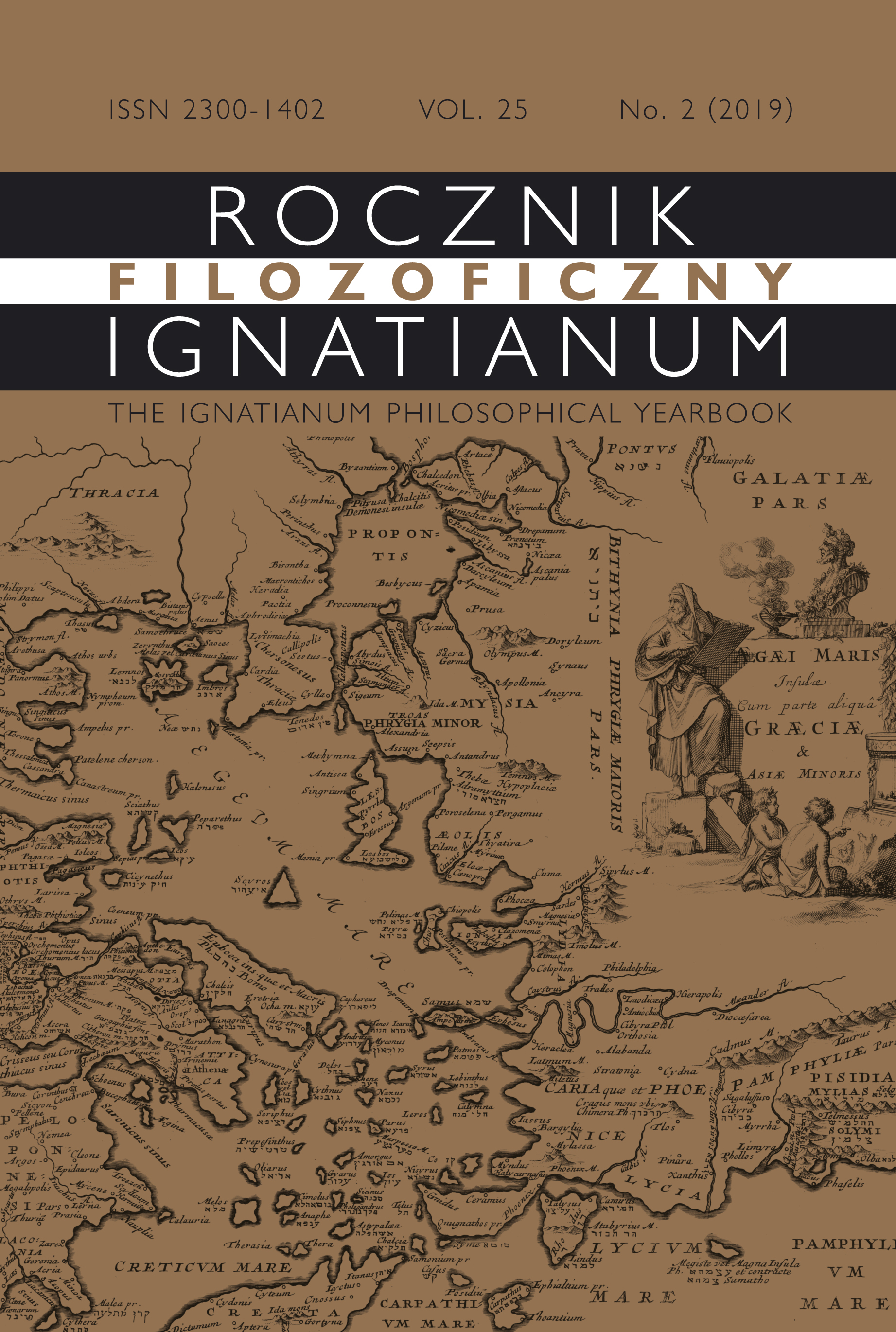Transcendence, Immanence, Mystery
The Figures of God’s Invisibility in the Contemporary Phenomenology of Religion
Abstract
The article addresses the problem, which has not yet been analyzed in the Polish philosophical and anthropological literature, and which deals with the subject of unknowability or invisibility of God in the contemporary French phenomenology of religion. The text focuses on the ideas of transcendence, immanence and mystery as developed and further elucidated by Emmanuel Lévinas, Michel Henry and Gabriel Marcel. The author deduces from the philosophical discourse on the three concepts that the transcendence (as understood by Lèvinas) and immanence (as perceived by Henry) are the ideas which unilaterally carry out the tasks set for them by their authors, which is “to protect” God from objectification to which the phenomenological method leads when applied to the problem at stake, in particular, as it was presented by Edmund Husserl. Not only Lévinas and Henry were in opposition to this method but so was Marcel. who had used the concept of mystery for the same reason. According to the author of the article, neither the transcendence (Lévinas) nor the immanence (Henry) but the concept of mystery (as developed by Marcel) is the one which «protects» God the most efficiently against objectification. From the phenomenology of religion point of view the most important thing is that in Marcel’s thought God does not appear as a phenomenon (as Gerardus van der Leeuw and Lévinas and Henry believed), and yet that does not exclude the religious relationship between Man and God.
According to Lévinas and Henry this biblically understood relation cannot exist even though their concepts also have relatively strong foundations in the Bible. Therefore, the author of the text believes that the Marcelian concept of mystery meets the expectations of a believer (homo religiosus) better than the Lévinasian concept of transcendence and the Henrian idea of immanence. The concept of God as the Mystery as developed by Gabriel Marcel allows man to enter into a religious relationship with God by the means of prayer.
References
Biemel Walter, „L’idée de la phénoménologie chez Husserl”, w Phénoménologie et métaphysique, red. Jean-Luc Marion i Guy Planty-Bonjour (Paris: Presses Universitaires de France, 1984), 81-104.
Greisch Jean, Le buisson ardent et les lumières de la raison : L’invention de la philosophie de la religion, t. II: Les approches phénoménologique et analytiques (Paris: Cerf, 2002).
Heidegger Martin, „Onto-teo-logiczny charakter metafizyki”, tłum. Janusz Mizera, Principia, t. XX (1998): 165–184.
Henry Michel, C’est Moi la Vérité. Pour une philosophie du christianisme (Paris: Seuil, 1996).
Henry Michel, L’essence de la manifestation (Paris: Presses Universitaires de France, 2003).
Henry Michel, Phénoménologie de la vie, t. IV: Sur l’éthique et la religion (Paris: Presses Universitaires de France, 2004).
Henry Michel, Entretiens (Cabris: Sulliver, 2007).
Henry Michel, O fenomenologii, tłum. M. Drwięga (Warszawa: Wyd. IFiS PAN, 2007).
Henry Michel, „Sztuka i fenomenologia życia”, tłum. Monika Murawska, Prze gląd FilozoficznoLiteracki 3/34 (2012): 156–179.
Henry Michel, Wcielenie. Filozofia ciała, tłum. Dariusz Adamski, Małgorzata Frankiewicz (Kraków: Homini, 2012).
Jan Paweł II, Przekroczyć próg nadziei (Lublin: Redakcja Wydawnictw Katolickiego Uniwersytetu w Lublinie, 1994).
Lévinas Emmanuel, O Bogu, który nawiedza myśl, tłum. Małgorzata Kowalska (Kraków: Wyd. Znak, 1994).
Lévinas Emmanuel, Imiona własne, tłum. Janusz Margański (Warszawa: Wyd. KR, 2000).
Lévinas Emmanuel, Bóg, śmierć i czas, tłum. Janusz Margański (Kraków: Wyd. Znak, 2008).
Marcel Gabriel, Od sprzeciwu do wezwania, tłum. Stanisław Ławicki (Warszawa: Instytut Wydawniczy PAX, 1965).
Marcel Gabriel, Homo Viator. Wstęp do metafizyki nadziei, tłum. Piotr Lubicz (Warszawa: Instytut Wydawniczy PAX, 1984).
Marcel Gabriel, Dziennik metafizyczny, tłum. Ewa Wende (Warszawa: Instytut Wydawniczy PAX, 1987).
Marcel Gabriel, Być i mieć, tłum. Donata Eska (Warszawa: Instytut Wydawniczy PAX, 1998).
Marcel Gabriel, Tajemnica bytu, tłum. Małgorzata Frankiewicz (Kraków: Wyd. Znak, 1995).
Perkowska Halina, Bóg filozofów XX wieku. Wybrane koncepcje (Warszawa– Poznań: Wydawnictwo Naukowe PWN, 2001).
Płotka Witold, Fenomenologia jako filozofia mniejsza. Rozważania wokół sporów o metodę Husserla (Warszawa: Liberlibri, 2019).
Schaeffler Richard, Filozofia religii, tłum. Elżbieta Kowalska (Częstochowa: Częstochowskie Wydawnictwo Diecezjalne Regina Poloniae, 1989).
Souche-Dagues Denise, Le développement de l’intentionnalité dans la phénomé nologie husserlienne (Paris: Vrin, 1993).
Tarnowski Karol, Bóg fenomenologów (Tarnów: Biblos, 2000).
Tarnowski Karol, „Intencja a refleksja. Fenomenologia, Nabert, Marcel”, w: Mię dzy przedmiotowością a podmiotowością: intencjonalność w fenomenologii francuskiej / Entre l’objectivité et la subjectivité: l’intentionnalité dans la phénoménologie française, red. Andrzej Gielarowski, Robert Grzywacz (Kraków: Akademia Ignatianum–Wydawnictwo WAM, 2011), 19–34.
Tischner Józef, Filozofia dramatu. Wprowadzenie (Paris: Éditions du Dialogue, 1990).
Van der Leeuw Gerardus, Fenomenologia religii, tłum. Jerzy Prokopiuk (Warszawa: Książka i Wiedza, 1997).
Copyright (c) 2021 Jesuit University Ignatianum in Krakow

This work is licensed under a Creative Commons Attribution-NoDerivatives 4.0 International License.
The Yearbook only accepts materials for publication that are free of all conflicts of interest, and that in no way involve conflicts over authorship, copyright, etc. The Editors will take action against any cases of plagiarizing, ghostwriting1, guest/honorary authorship2, etc. Where co-authored work is concerned, the Author listed first is expected to take responsibility for the submission, and is required to make clear the contributions of all of the Co-Authors involved. In the event of the publication owing its existence to funding dedicated to this purpose, this fact should be made clear: e.g. in any note of thanks/acknowledgement, or in a footnote, etc. Explicit notification should be given of any form of reprinting, with the appropriate evidence of permission to publish being furnished as required. Any impropriety on the part of Authors/Reviewers risks exposing them to appropriate responses from the relevant institutions.
______
1 This term refers to instances of a person who has made an essential contribution being omitted from the list of authors, or from notes conveying gratitude and/or acknowledgement.
2 This occurs when a person who has made either an insignificant contribution or no contribution at all nevertheless appears on the list of authors.





